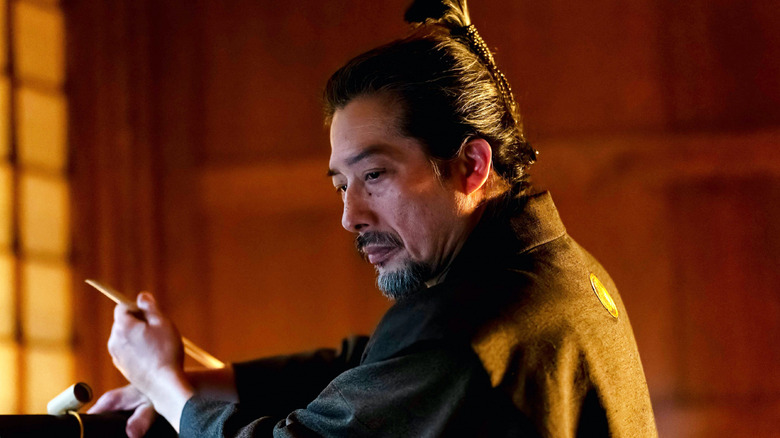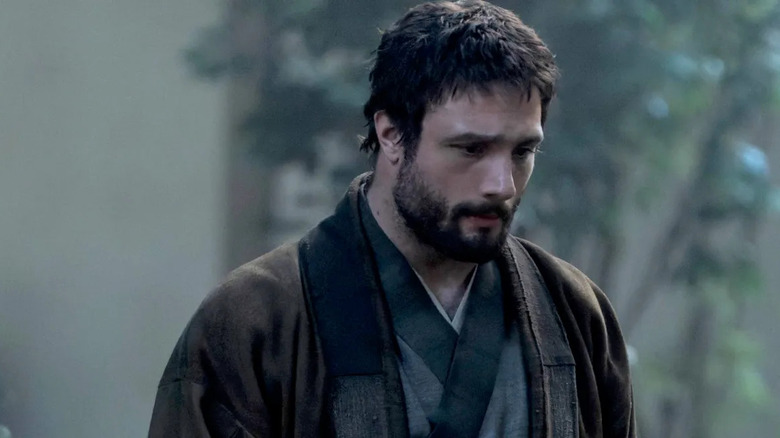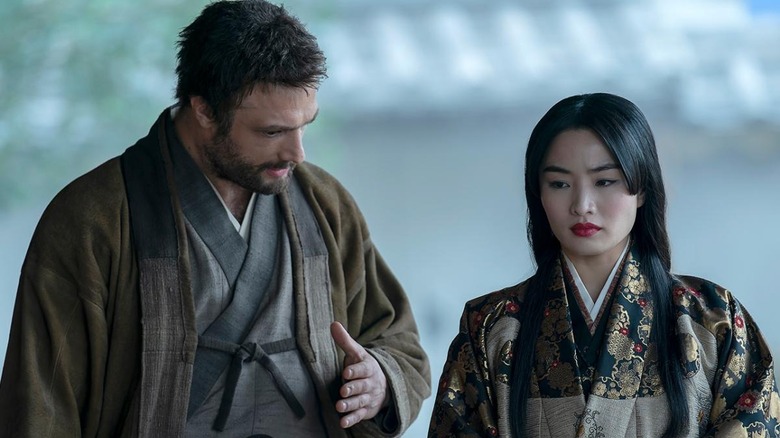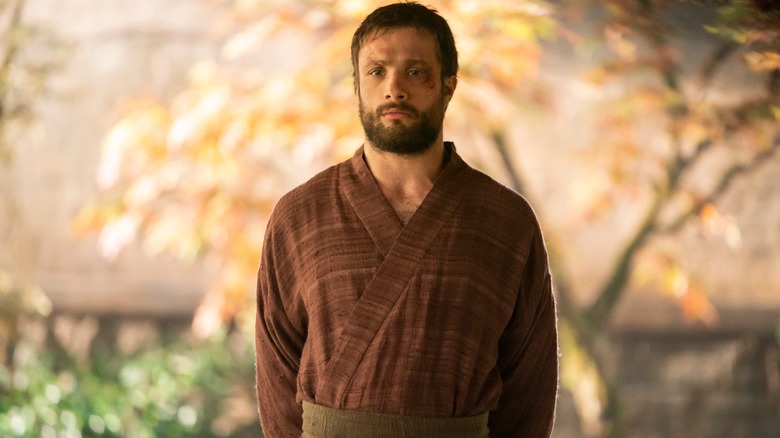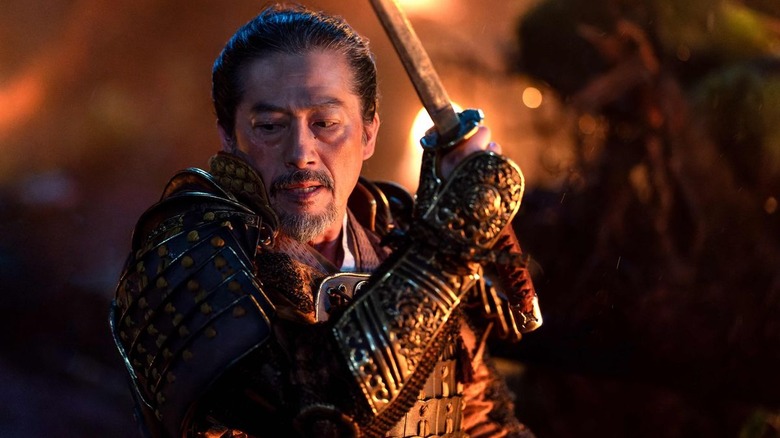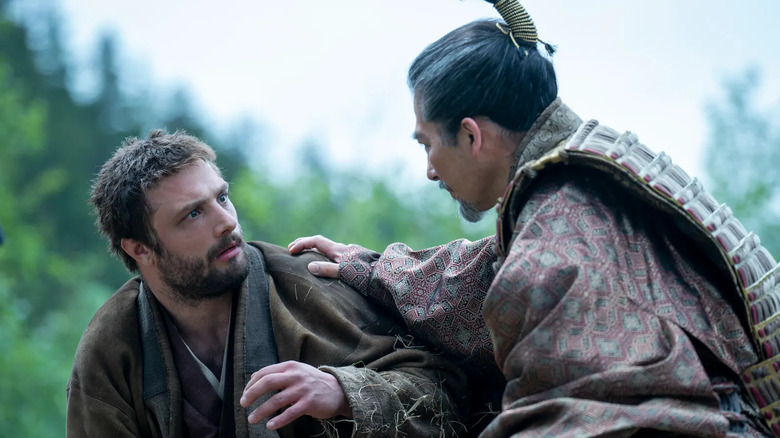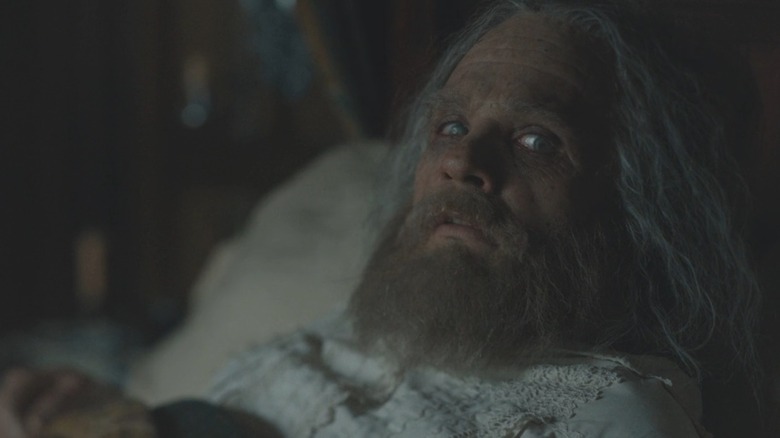Shōgun Ending Explained: This Was Never Blackthorne's Story
We may receive a commission on purchases made from links.
This article contains spoilers for both "Shōgun" the 2024 TV show and the 1975 novel.
When I first finished James Clavell's novel "Shōgun," the comparison that immediately came to mind was Homer's "Iliad." The epic Greek poem is famous for recounting the events of the Trojan War, a war that is still famous thousands of years later. I was hardly an expert at Greek mythology before reading "The Iliad," but going in I already knew two big events: that the fierce warrior Achilles (who was portrayed by Brad Pitt in Wolfgang Petersen's "Troy") died near the end of the Trojan War, and that the Greek soldiers won by hiding inside a giant wooden horse and tricking the Trojans into letting them behind their city walls.
The latter was the big moment I was looking forward to. The Trojan horse is such an iconic image; it's still referenced constantly in pop culture and is so ubiquitous that the U.S. even named its most popular condom brand in its honor. But as I read through the second half of "The Iliad," I grew increasingly confused by how little the war had progressed. It was only by the final few chapters that I accepted Achilles wasn't going to die in this book, nor would we be getting to the famous horse scheme. "The Iliad" is remarkably uninterested in the conclusion to the Trojan War; if you want to see that, you'll have to check out "The Aeneid."
It's hard not to feel a little cheated by Shōgun's ending
Such is the case with "Shōgun." Although most readers likely aren't familiar with all the historical events the book's based on, the first 800 pages (and the first nine episodes of the 2024 show) strongly imply that this story's gonna end with a big, climactic battle. It's what all the characters are talking about, after all. Surely a story called "Shōgun" wouldn't just end before we saw the battle that made Toranaga Shōgun, right?
Wrong. "Shōgun" ends with what could easily feel like a string of anti-climaxes. Blackthorne's ship, which he was supposed to use to bring fire upon the Portuguese ships, is burned down off-screen. Yabu, who has been scheming for nine episodes straight, is simply exposed after his latest betrayal and ordered to commit Seppuku. (He does so without complaint.) Blackthorne and Buntaro, who've been at each other's throats all season, simply make amends. Most notably, Toranaga reveals that he's already negotiated the deal that will win him the war; the battle won't be for another few months, but it's basically already been won.
It's surprising because the first half of this season really hyped up this battle. We've been told repeatedly that Toranaga's an amazing military tactician, just as we've been told that Blackthorne's knowledge of cannon warfare will massively change the course of Samurai warfare in a cool, cinematic way. The show also gave us multiple episode-ending cliffhangers that really seemed to imply a war-heavy episode the following week, only for that episode to be surprisingly peaceful yet again. It turns out the whole season was a bait-and-switch, not dissimilar to what Toranaga just pulled on his enemies. Does the intentional anti-climax work? Yes, mainly due to one key character.
This was always Mariko's story
The highlight of every version of "Shōgun," even the 1980 mini-series, is clearly Mariko. As a Christian Samurai, she's originally presented in the book as nothing more than the bridge between Blackthorne and Toranaga, a tool for them to communicate better. We've seen plenty of fish-out-of-water narratives in historical fiction, just as we've seen plenty of cunning leader archetypes, but rarely does a book ever center around a translator. Yet, as the 1200+ page novel went on, it became increasingly clear that Mariko was the real protagonist. She was the one with the tragic, heroic character arc, whose actions decide the outcome of the entire political conflict the novel is based around.
Yet the conclusion of the novel felt a little awkward. It was partly because James Clavell wasn't quite as good at writing the Japanese characters' viewpoints, but also because he took his sweet time introducing Mariko. It takes about 200 pages before she's properly introduced to Blackthorne, and another 100 pages before it becomes clear just how central she is.
That's why it was such a great move for the FX mini-series to not only put in the work to bring more complexity and historical accuracy to Mariko and the other Samurai characters but to make a big change from the "Shōgun" book by introducing Mariko straight from the jump. From the first two episodes, viewers knew about her suicidal ideation and her miserable marriage — knowledge that book readers were denied until 500 pages in. "Shōgun" also made it clear that Mariko is not just a main character but the main character, to the point where, when Mariko dies, we should know that the story's basically over. The show is most of all about Mariko and how she changed the lives of everyone around her.
Another key change to the ending of Shōgun
Of course, the "Shōgun" finale is not just an extended epilogue. It features the climactic culmination of Blackthorne's gradual embrace of the Samurai ways, where he nearly commits Seppuku in protest of Toranaga's mistreatment of the villagers. It's a scene many book fans assumed had been cut entirely, as book Blackthorne's suicide attempt took place around the halfway point. Both scenes serve as a clear turning point for the character, establishing that Blackthorne has now come to understand a fundamental aspect of feudal Japanese culture. But the show's placement makes way more sense; it's a natural escalation of Blackthorne offering to be Mariko's second last week and a significant final note to end his story. Blackthorne also confesses to trying to use Toranaga for his personal benefit; it's not clear how much Toranaga understood from this monologue, but it still serves as a clear condemnation of the white savior narrative that "Shōgun" is often accused of being.
As for Toranaga? The show allows him to monologue to Yabu about how he'll take down Ishido. It's another welcome adaptive flourish, one that helps to underline the weird, begrudging respect between the two. Toranaga might've never trusted Yabu, but he always seemed amused by Yabu's attempts to be a cunning schemer like himself. It's almost sweet for Toranaga to give Yabu this gift of knowledge at the end, even if he'll never get to use it. With his love of betrayal and his recurring obsession with death, there's no version of this story where Yabu doesn't die at the end, but at least he dies with dignity. A lesser story would've had Blackthorne get his revenge for Yabu boiling one of his crewmates alive, but "Shōgun" wisely doesn't give us anything so straightforward.
Why Shōgun (and The Iliad) work
In the end, "Shōgun" is a success because it understands why so many other beloved historical dramas and epic fantasy series were successful: they knew that the political maneuvering is far more interesting than the battles themselves. There's a reason why everyone loved the first few seasons of "Game of Thrones," even though nearly every scene was technically just a conversation. Stabbing someone in the back with words will always be cooler than stabbing them with a literal knife, as Toranaga's poor son found out earlier in this season.
For "The Iliad," the story works because it stays focused on the horrors and pointlessness of war. If it had ended with the successful sack of Troy it could've been mistaken for a heroic story; instead, it ends with the mourning of all the dead and the promise of more death and suffering to come. The delightful wooden horse trick wouldn't have fit thematically.
"Shōgun," meanwhile, is a story about patience and endurance, about embracing The Eightfold Fence and not rushing into rash, emotional decisions. Toranaga's been telling us from the beginning that he's not the type to fight a war if he doesn't know for sure he'll win it ahead of time; an epic sequence like The Battle of Helm's Deep would've been cool, but Toranaga would never let himself get swindled into such a long, chaotic, uncertain conflict. It may not have been a flashy finale, but it was the most fitting ending "Shōgun" could ever ask for.
What the creators have said about Shōgun's Season 1 finale
In a post-finale interview with Slate, the "Shōgun" showrunners explained how undercutting the white savior narrative with Blackthorne was a conscious part of the plan, and they did this in part by moving Blackthorne's attempted seppuku way back into the finale. As Justin Marks put it:
"There's a very famous portion of the book where Blackthorne proposes seppuku, and that's a moment that carries a lot of weight, but it occurs earlier in the book, and we didn't feel like it was earned, so we kicked it down the line to where it carried more weight. [...] We felt there was a little bit of, I don't know, almost a cosmic humor, almost at Blackthorne's expense in the long tradition of many, many decades of Hollywood doing the white savior archetype. Under different circumstances, this might be a classic white savior moment: 'Please accept my life in protest of what you're doing to this village,' except for the fact that we reveal that the whole setup with the village is false. It's a scam. It's just meant to get him to that point."
Marks also shed some light on Mariko's character arc and the way her love story with Blackthorne was de-emphasized slightly compared to the book. "The reference that was always there in the writers room for this show was 'In the Mood for Love.' It's one of the greatest films ever made, full stop. The fact that it's not already sitting at the top of Sight and Sound is just a crime," he said. ("In the Mood for Love" is a 2000 Hong Kong-based romantic drama that similarly ends on a bittersweet note.) Marks continued:
"This isn't the story of the working woman who turns away from it to finally fall in love or something. She does fulfill her dream and her purpose. Yes, it requires sacrifice at the end for her, and that is a tragedy, but it also was a victory for her because she finally lived for an expression of how she wanted to shape the world. That is a triumph, and it's a triumph that is denied almost every other character on this show — and a lot of the women on this show — and so, really, we mark that as a victory."
What the creators have said about the finale's opening scene
Another point of confusion within the fandom in the months since Season 1 ended and "Shōgun" was renewed entails the finale's opening sequence, which seemingly flash-forwards to an elderly Blackthorne back in England on his deathbed. Although the rest of the finale makes it pretty clear that this isn't a real flash-forward, considering that Blackthorne's ship is burnt down and Toranaga thinks he'll never return to his homeland, the confusion among some viewers still persists. In their interview with Slate, the creators explained their intent with the scene:
"There's a little ambiguity that we'd like to stay there. But definitively, after the shock of Mariko's death, we initially frame the story as if it were the recollection of an old man looking back on his life with regret in some way, only to find that what we were really seeing was the dream of a young man looking forward with regret to the life that he could possibly have. We really wanted Blackthorne's choice at the end of this show, from the very beginning, to be about a denial of this path. To turn towards a new identity, a new life."
It's a complicated idea to convey but it makes sense, especially with the story's subversion of the white savior narrative and the decision to have Blackthorne embrace the Samurai mindset as much as possible. That false flash-forward presents a world where Blackthorne leaves Japan and doesn't internalize anything he's learned from it. His imaginary grandkids talk excitedly about Blackthorne having used his samurai sword to "fight off a whole army of Japanese assassins," asking him, "Was it really given to you by a savage?" It presents a future where Blackthorne describes (and dismisses) to his English friends and family his time in Japan as a shallow, exoticized adventure. But with the episode's final moments of Blackthorne making peace with being stuck in Japan, it's clear that this future has been averted for him.
"There's a line where Mariko says that all Blackthorne is chasing is his free will but he'll never be free of himself," said co-creator Rachel Kondo. "I remember feeling my brain trying to work better, and be sharper, to understand that. [...] As Westerners, the impulse is always about drive. It's about getting there. It's about me. It's about how I will be furthered in every way. That's a mission. That's why we're up to stuff and we're busy. But it's a kind of enslavement, I think."
It's the central argument between Mariko and Blackthorne throughout the show's first nine episodes: Blackthorne wants the freedom to control his own destiny, whereas Mariko finds the freedom with the destiny already laid out for her. Most western shows would ultimately vindicate Blackthorne's point-of-view, but in the final moments of "Shōgun," the show vindicates Mariko's. As Marks put it:
"I think you're looking at, in Blackthorne, a man who's been restored to purpose, so he feels alive again, as many men like Blackthorne need purpose to feel alive, but he's been successfully broken to Toranaga's fist, finally. He is no longer the author of his own destiny in the way that he thought he was in the beginning, and he's finally free because of it, because he finally can let go and subordinate himself to — as the Japanese would call it — the pattern of events, this fact of life that you can't ever control."
